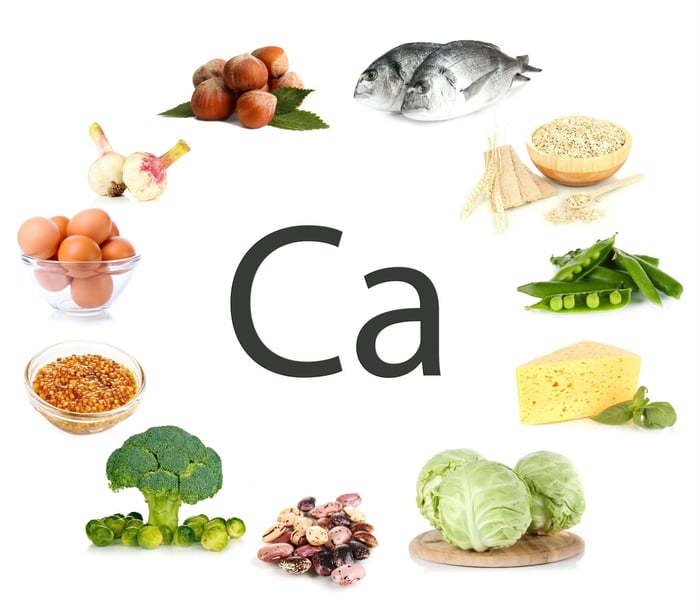The Top Calcium Rich Foods Non Dairy Just for You

Ellie Lopez, LDN, MS
Nutrition
|
Healthy Lifestyle
11/05/2025 12:03pm
8 minute read
When we think of calcium, dairy products like milk, yogurt, and cheese usually come to mind. But there’s a wide variety of calcium rich foods non dairy that can help you meet your daily needs—especially if you’re lactose intolerant, vegan, or simply prefer plant-forward meals.
Calcium plays a vital role in bone health, muscle function, and nerve transmission, and also supports blood vessel flexibility for heart health (NIH, Harvard Health). The recommended daily intake for most adults is about 1,000 mg—and it’s entirely possible to achieve that without dairy.
Below, we’ll explore some of the best calcium rich foods non dairy that are tasty, nutrient-dense, and easy to add to your meals.
The Top Calcium Rich Foods Non Dairy
1. Tofu Made with Calcium Sulfate
When tofu is coagulated with calcium sulfate, it becomes a genuine calcium powerhouse. A typical half-cup (≈ 126 g) serving delivers about 861 mg of calcium according to the USDA’s “Calcium Content of Foods” listing. On top of that, it’s rich in plant-based protein and easily adapts to stir-fries, curries or salads—making it an excellent entry in your list of calcium rich foods non dairy.
2. Kale – The Leafy Green Powerhouse
A cup of raw kale offers about 50 mg of calcium, while cooked kale delivers around 175 mg, according to USDA data. Kale also packs vitamin K, which works synergistically with calcium to support bone strength and healthy metabolism. Because its calcium is well absorbed, kale stands out among leafy greens — add it to smoothies, sauté it in olive oil, or bake crispy kale chips for a nutrient-dense snack.
3. Bok Choy (Chinese Cabbage)
According to the most recent USDA FoodData Central analysis (2024), 100 g of raw bok choy provide roughly 62 mg of calcium, or about 40–45 mg per cup when shredded. Its calcium is highly bioavailable — meaning your body absorbs it efficiently compared to greens high in oxalates like spinach. With its mild flavor and crisp texture, bok choy is perfect for soups, stir-fries, and salads as part of your regular calcium rich foods non dairy rotation.
4. Broccoli
Broccoli isn’t just full of fiber and antioxidants — it also offers about 35 mg of calcium per cup. Its calcium is easily absorbed and comes with a mix of nutrients that support digestive and metabolic health. Enjoy it steamed, roasted, or tossed into a colorful stir-fry.
5. Sweet Potatoes
A 100 g serving of baked sweet potato flesh contains around 33 mg of calcium. That’s about 38 mg for a medium-sized sweet potato. While not the most concentrated source, sweet potatoes still contribute meaningfully to calcium intake and provide potassium, fiber, and beta-carotene (vitamin A). Enjoy them baked, mashed, or cubed into bowls for a comforting, nutrient-packed meal.
6. White Beans and Chickpeas
Legumes are calcium-friendly heroes. Cooked white beans provide about 90 mg per 100 g, or roughly 160 mg per cup, while cooked chickpeas contain about 49 mg per 100 g (≈ 80 mg per cup). They also deliver magnesium, potassium, and folate — nutrients that work together to support bone, muscle, and energy metabolism. Add them to soups, salads, or stews for a hearty and nourishing meal rich in plant protein and minerals.
7. Almonds and Chia Seeds
A ¼-cup serving of almonds (≈ 30 g) provides about 75 mg of calcium, while two tablespoons of chia seeds (≈ 24 g) deliver around 150 mg. Together, they make a compact, nutrient-dense snack loaded with healthy fats, fiber, and antioxidants. Sprinkle almonds on yogurt or salads and add chia seeds to smoothies, puddings, or oatmeal for an easy, daily calcium boost.
8. Sardines and Canned Salmon (with Bones)
Not all calcium sources are plant-based — some of the richest come from the sea. Canned sardines with bones contain about 382 mg of calcium per 100 g (≈ 325 mg per 3 oz), and canned salmon with bones provides around 198 mg per 100 g (≈ 170 mg per 3 oz). Both are highly absorbable sources of calcium and also offer omega-3 fatty acids and protein that promote bone and cardiovascular health.
9. Fortified Plant Milks and Juices
Fortified plant-based beverages are one of the easiest ways to meet calcium needs without dairy. The Dietary Guidelines for Americans list fortified soy, almond, and rice beverages that typically provide ≈ 280–440 mg of calcium per cup (240 mL), depending on the brand and fortification level.
Many calcium-fortified orange juices also meet this standard, offering about 300 mg per cup, along with vitamin C and added vitamin D. Because fortification varies, always check the Nutrition Facts label and choose unsweetened options fortified with both calcium and vitamin D to maximize nutritional value while minimizing added sugars.
10. Dried Figs
According to USDA , dried figs contain about 162 mg of calcium per 100 g, around13.6 mg per fig (≈ 8.4 g), and 241 mg per cup (≈ 149 g). Beyond their calcium contribution, dried figs are rich in fiber, potassium, and antioxidant compounds. They’re a naturally sweet, portable, and nourishing snack — perfect for mixing into oatmeal, salads, or trail mixes as part of your calcium rich foods non dairy lifestyle.
Why These Calcium Rich Foods Non Dairy Matter
Getting enough calcium from food is essential not only for bone density but for overall vitality. Here’s how these foods work for your body:
Support bone and muscle strength: Calcium, magnesium, and vitamin K in greens like kale and bok choy help maintain strong bones and reduce the risk of osteoporosis (NIH).
Boost energy and metabolism: Calcium helps muscles contract efficiently and supports normal nerve signaling, keeping you active and energized.
Aid in weight management: Many of these foods—like kale, tofu, and legumes—are low in calories and high in nutrients, promoting fullness without excess calories.
Promote cardiovascular health: Adequate calcium intake helps regulate blood pressure by supporting blood vessel function (Harvard Health).
Reduce chronic disease risk: Diets rich in plant-based calcium have been linked to lower risks of hypertension, diabetes, and metabolic syndrome.
By embracing a diverse range of non-dairy calcium-rich foods, you can harness their array of health benefits to enhance fitness and maintain optimal energy levels. As you embark on your journey to attain and sustain fitness by incorporating non-dairy calcium-rich foods into your diet, you'll discover that CleanEatzKitchen's affordable meal delivery service can be a supportive companion for you, so definitely give it a try sometime.
Tips to Maximize Calcium Absorption
Pair calcium with vitamin D: Your body needs vitamin D to absorb calcium effectively. Get sunlight exposure or include vitamin D–fortified foods and fatty fish.
Spread calcium intake throughout the day: Your body absorbs calcium better in smaller doses, not all at once.
Watch high-oxalate foods: Spinach and beet greens are healthy but their calcium is less bioavailable. Stick with kale, bok choy, and broccoli for better absorption.
Keep balance: Too much calcium (especially from supplements) can lead to kidney stones—stick to food-based sources whenever possible.
Final Thoughts
You don’t need dairy to meet your calcium goals. With so many calcium rich foods non dairy available—from tofu and leafy greens to seeds, legumes, and fortified milks—it’s easy to build a balanced, satisfying diet that supports your bones, muscles, and long-term vitality.
FAQ
What happens if I don't get enough calcium?
A long-term calcium deficiency can lead to bone loss and increased risk of osteoporosis, a condition that makes bones weak and fragile. It may also causemuscle cramps, tingling sensations, or abnormal heart rhythms in severe cases. (NIH Office of Dietary Supplements)
Does calcium help older adults?
Yes. Adequate calcium intake, together with vitamin D and physical activity, helps slow bone loss and reduce fracture risk in older adults. Maintaining strong bones supports balance and may lower the likelihood of falls and injuries.
Can consuming too much calcium cause problems?
Yes. While most adults need 1,000–1,200 mg of calcium per day, consistently exceeding 2,000–2,500 mg (the upper safe limit) may cause kidney stones, constipation, or reduced absorption of other minerals. It’s best to get calcium mainly from foods rather than supplements unless prescribed by a healthcare professional. (NIH Office of Dietary Supplements, 2023)
Is calcium safe for babies and children?
Yes, when provided in appropriate amounts for age. Calcium is essential for growing bones and teeth, muscle function, and nerve signaling. Infants, children, and teenagers need calcium-rich foods daily to support healthy development and peak bone mass.
Related Articles
Find Your Motivation For Weight Loss
6 minute read



